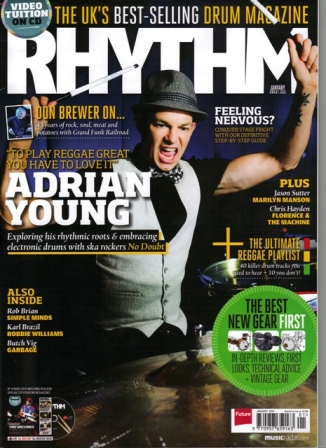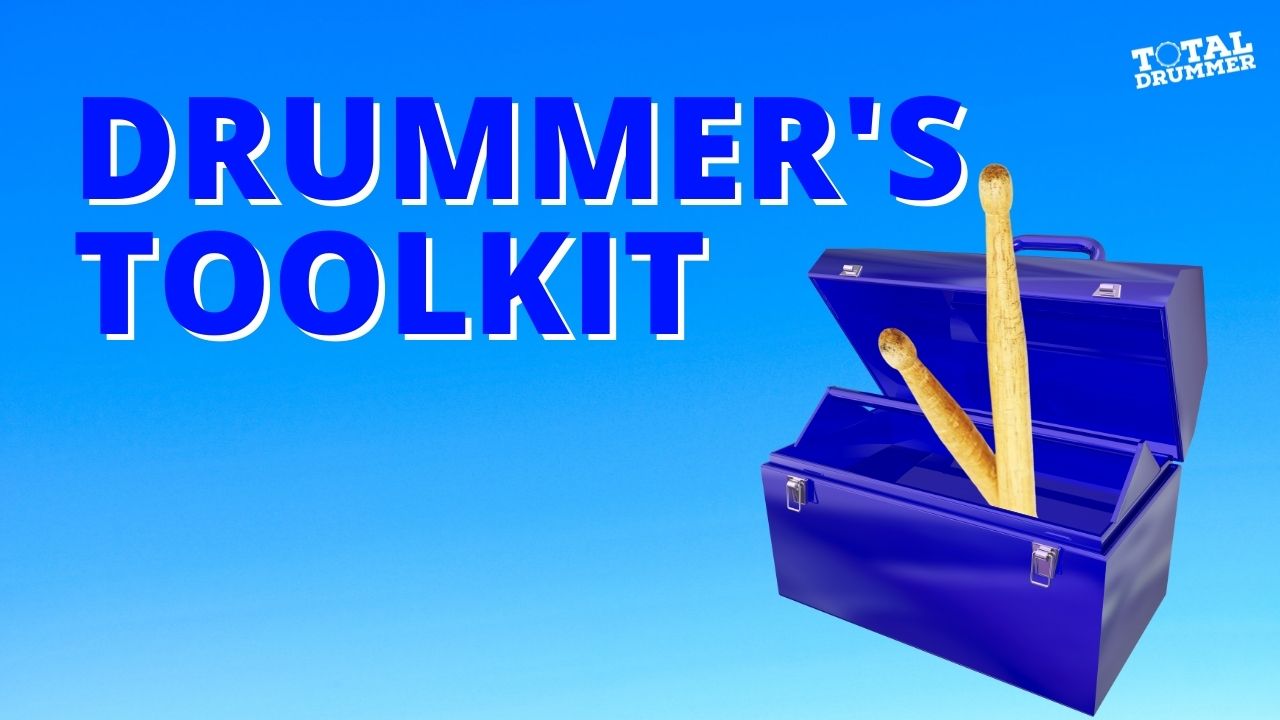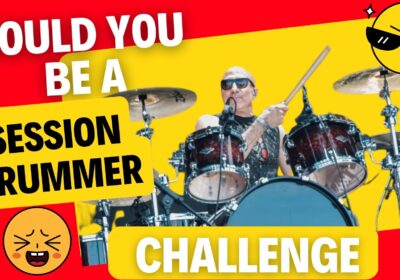Stage Fright for Drummers
How to conquer stage fright
Stage fright is real. The archetypal tattooed, macho drummer is prevalent; but even big hairy rock drummers get scared!
[This is a stage fright article that was first published in Rhythm magazine January 2013]
– VIDEO BELOW –
 Most drummers have experienced nerves in some capacity before a gig, audition, or recording session. It may occur just before the performance or days in advance, and manifest itself as a nervous anticipation that stimulates an inspired performance, or a debilitating dread that actually prevents you going on stage.
Most drummers have experienced nerves in some capacity before a gig, audition, or recording session. It may occur just before the performance or days in advance, and manifest itself as a nervous anticipation that stimulates an inspired performance, or a debilitating dread that actually prevents you going on stage.
For those who suffer these negative aspects, they can seem isolated and trapped without a solution in sight. These drummers feel forced to endure this affliction night after night. This can make their life hell or even cause them to hang up their sticks.
Drugs are a common answer to anxiety and insecurity; but smoking increases the heart rate and therefore stress levels, alcohol impairs performance, and illegal substances become a crutch, then an addiction, and ultimately destroy lives. Another common choice is the use of beta blockers but Sean Grey, EFT expert tells us, “This results in drummers resigned to just surviving a performance, losing all feel and connection to the music.” Finally we have the problem of this being a slightly taboo subject, with musicians often keeping quiet through fear of appearing unprofessional or inferior.
Fortunately, there are simple steps you can take, as well as specially trained people on hand to help. This Stage Fright guide looks into the problem and finds out how drummers can free themselves from this misery and regain the pleasure of drumming.
Do I have Stage Fright?
We must distinguish between Stage Fright and the more serious Music Performance Anxiety (MPA). Stage fright affects around 80% of drummers, causing symptoms such as the psychological self doubt or expecting failure, as well as the physical sweaty palms, muscle tension, palpitations, short breath, dry mouth, and shaking hands. These are primitive ‘fight or flight’ reactions that prepare our bodies for physical combat or fleeing. Today we find ourselves less likely to fight a beast, but more likely to battle with anxiety when drumming in public.
Common stage fright often stimulates arousal which allows a positive, energetic performance. If our state of arousal is too low when we drum, the performance will be lack lustre. But it is when this nervous reaction becomes debilitative that we have a problem.
This is when a drummer is suffering from MPA; an experience of persisting anxiety, or even physical changes that hamper a performance, regardless of ability and experience.
MPA might manifest itself as anxiety, panic, memory loss, poor concentration, unusual breathing, sweating, increased heart rate, dry mouth, trembling, technical errors, difficulty moving naturally or even avoiding performing.
Dr. Louise Montello comments, “I see the sense of dread replace the original joy of music making. This can make playing music more of a chore than something that exhilarates and heals. The worst case scenario is that the stage fright is so severe that drummers have difficulty maintaining a steady beat, possibly leading to performance mastery issues or giving up their career. I also see how the stress associated with stage fright can create unhealthy movement patterns that can lead to injuries in drummers.”
But even without conscious dread, these symptoms can creep up. I think of myself as experienced and free from performance nerves but at a recent audition my forearm muscles were extremely tense and my grip was unusually tight. I felt confident, prepared, and relaxed so I couldn’t understand why this was happening. I now realise that it was a subconscious nervous reaction.
Causes
Montello says, “Serious performance anxiety can be traced to unresolved past traumas around performing and/or other issues like abuse, accidents, loss, etc.”
Grey adds, “When an artist is about to perform, often their biggest challenge is dealing with the emotional pressure of the occasion. The fear of failure, being judged, or letting themselves and others down.”
Certainly fixating on the audiences’ evaluation of your performance is a common issue. This critical evaluation could be deemed to be coming from total strangers, or close friends. In fact ten thousand strangers might be less daunting than a crowd of just five drummers.
Many drummers are noted for their perfectionism. This might be the motivation behind many great performances, but it can also lead to misery. They feel that their self worth as a drummer is reliant on each performance being impeccable. Often these sufferers won’t accept praise from others, and so every performance is destined to appear as a failure.
The constant struggle with perfectionism and self worth is sometimes accompanied by ‘catastrophising’; obsessing about negative events that will most likely not happen. These could include dropping a drum stick, falling off your stool, missing a cymbal, or forgetting your parts. Subsequently, we may become overly aware of the physical changes caused by the anxiety. What starts as slightly sweaty palms, or fast breathing, is seen as a sign of forthcoming disaster and huge anxiety is created out of nothing.
Although MPA is only found from adolescence upwards, and more frequently in females, it can seem indiscriminate by disregarding skill and experience.
Ironically it’s found in the higher level drummers quite frequently.
Having performed at a very high level, the drummer is conditioned to think that every performance must meet these self imposed standards, and therefore anxiety is attached to every performance. In a Music Radar interview Stewart Copeland described this as the ‘Eric Clapton Factor’ because Clapton felt unable to just simply go out and play the guitar reasonably well. He felt that the audience expected him to be brilliant. Copeland admitted to a similar problem, as sometimes he just wanted to go out and play the drums without having to be amazing. In another Music Radar interview Neil Peart told a story from Buddy Rich’s sax player, stating that Buddy would suffer from trembling hands before a performance because of the expectation on him to be the best drummer in the world.
Just as surprising is Ringo Starr who has spoken of vomiting before going on stage even after fifty years under the spotlight. Recently Dave Grohl admitted in The Sun to a “freaked out emotional breakdown” on stage at Wembley, and Taylor Hawkins spoke of crippling pre-performance fear.
Dr Carol Chapman says that, “Successful people may experience greater pressure and so their anxiety is increased. But different situations cause anxiety, such as a quiet drum roll where the drummer feels exposed. Some people feel terror at the thought of improvising. Some get anxiety when they perform at a big venue, but some get nervous playing to three people and a dog. It really differs from case to case.”
Learn to love drumming again
Here is a three part strategy to help overcome self doubt and anxiety.
1. Pre gig warm up
This physicality of drumming necessitates a fit body. Therefore good cardio-vascular fitness will enable you to better handle your job and feel more confident about achieving it. This was underlined in the recent Rhythm interview with Travis Barker who emphasised his commitment to staying physically fit on the road. I know that when I’m in top form I can’t wait to get on stage and enjoy playing, but when I’m feeling sluggish, I experience more apprehension.
An athlete wouldn’t prepare for a race with a fag and pint so maybe we drummers should re-evaluate our approach. Having completed the London marathon and the Three Peaks Challenge, I understand this on a sport level, but gig scenarios make it difficult unless extra care is taken. Recently I prepared for a gig with the provided unhealthy lunch, followed by two bottles of beer in the evening and two bacon baps for dinner. With a long soundcheck and insufficient time set aside for rest, I realised that I hadn’t consumed any water since lunch – a problem that sounds silly but is very easily done. Sure enough, in the last half hour of a physical gig, my energy was low and it became a distraction from the music. We then have the potential for tempo issues, catastrophising, and general loss of enjoyment.
I also forewent a warm-up. The result was that it took the first three songs to loosen up. Relatively easy fills felt less achievable and my arm muscles felt stiff. This increases the potential for poor performance and possible injury, and therefore anxiety.
So prepare healthy snacks for maintained energy levels before you arrive at the venue and avoid a huge pre-gig dinner that leaves you bloated and lethargic. Always have a bottle of water beside you for easy regular intake and make sure that there is plenty on stage for the performance.
Schedule time for rudimental pad work, stretches, or whatever works for you so your body is ready to get up and perform from the first note to the last. Whilst warming up, try to instil positive thoughts in your mind. Don’t focus on the non-existent over critical audience. Instead visualise a positive response. Imagine yourself playing at your best level and enjoying the experience.
2. Equipment, preparation and during the gig
Be prepared and capable and you will have nothing to fear. Choose repertoire that is well within your ability where possible. If you are forced to play something challenging, practice until it’s comfortable. The greater the challenge, the greater your risk of MPA. Before an audition, gather as much information on what the band or artist wants. Learn their material inside out, get there early, and make sure you have the right equipment to be at ease.
Be sure to pace yourself at gigs. Think about the length of your set. To use a sporting analogy again; a 10,000 metre runner wouldn’t start as quickly as a 100 metre sprinter. If he did he would soon fatigue. You can also fatigue too early which means you won’t be able to keep time, your coordination will become sloppy, and your technique will diminish. That doesn’t mean you should be lack lustre for the first few songs, but learn how to create energy in your playing without using unnecessary effort. This might mean developing better technique, setting your kit up more ergonomically or playing with less tension.
It might also come down to breathing. Although this seems pretty obvious, many drummers do forget to breathe when concentrating too hard or playing difficult parts. This is denying our body of the thing it needs most; oxygen. Without it, our muscles are deprived of their fuel and the heart works faster. We are trying to avoid stress so increasing heart rates and overworking muscles is counterproductive.
This can be solved with conscious thought. If I ever catch myself not breathing, I consciously take deep, slow breaths of air. I instantly feel my whole body relax and drumming becomes easier. This can become part of your practice routine, by playing various drum patterns whilst simultaneously focusing on deep, slow breaths. You may find this quite meditative which will keep you calm if you transfer it to gig scenarios.
It’s also important to control the situation as much as possible. Make sure you have the best equipment available to you. Take time to tune your drums so they sound great. Make sure you get the correct mix in your monitors at soundcheck. If your drums sound great, then you will feel confident and inspired.
3. More serious sufferers
Continuously debating who the best drummer in the world is, and such competitions as the World’s Fastest Drummer, may serve a purpose in music, but they also have the potential to misguide us. Music is not a competition; it differs from sport in this way. Music is an art form. There is no ‘best drummer in the world’ there are only individual opinions. Every drummer has the ability to move their listeners, whether they’ve played drums for a month or a decade. If the rhythm plays a part in creating an emotion in their listeners, then it has achieved the greatest thing that music can.
And yet many of us perceive the industry in this way. My experience is that the drumming community is a very warm, supportive and welcoming group that love sharing their passion and encouraging one another. I have personally had to remind myself this numerous times over the years, and get away from worrying that Mike Mangini’s right hand is faster than both of mine combined, to return to the fact that I drum because I love drumming. Art is subjective; play with passion, commit to each note and lose yourself in the music. As drummers we should not focus on a judgemental audience, but on the joy of being on stage making music.
However, if we experience serious MPA it may take more specialised approaches. A good starting point would be BAPAM (British Association for Performing Arts Medicine) who exist to help musicians with all health issues for free or little cost. This might involve seeing an expert like Carol Chapman who offers therapies such as Cognitive Behavioural Therapy and Personal Construct Psychotherapy.
Alternatively Sean Grey suggests, “EFT and other energy therapies are able to deal with the fight or flight response to stress by balancing the body’s energy system and reprogramming the subconscious that runs our life. It can also release the physical tension drummers experience from playing when their muscles are tight and tense. It can be used subtly before a performance and as tapping sends calming messages to the brain, the need for drugs, alcohol or smoking can be lessened. Once the negative belief has been cleared, positive affirmations can take hold.”
These techniques may sound a little clinical or new age but this is a psychological problem and a complex issue to tackle. When asked if we can completely get over MPA Dr Montello says, “Yes, through utilizing the Performance Wellness techniques (proper breathing, meditation, restructuring negative thoughts, connecting with your Essential Musical Intelligence) in daily life, performers can regain the joy of playing music and completely transform the victim stance into a deep, grounded sense of personal power and mastery.”
It is important to remember that people want you to succeed. They go to watch a band for enjoyment and want you to do well. The examiners want you to pass. People are there to support you so why not support yourself.
If you are suffering from performance anxiety, it is important to seek suitable help. Explore the different options laid out in this article, get the right help and get back to enjoying drumming the way you did when you first picked up a pair of sticks.
Dr. Louise Montello, award winning author, therapist, and musician, is founder and director of Performance Wellness, Inc. dedicated to facilitating performance mastery and nurturing body, mind, and spirit for over 20 years.
Sean Grey, performance coach with a difference/EFT pioneer. Sean has a wide range of experience of helping, musicians, singers, sportsmen and women deal with performance anxiety. His clients include members of the B.B.C National Orchestra for Wales, the Welsh National Opera and students at the Royal Welsh College of Music and Drama. He has also worked with some of the top young tennis players and golfers in Wales. His skills have also been used on shows such as ITV’s Dancing on Ice. http://stagefrightfreedom.wordpress.com
Dr Carol Chapman, Counselling Psychologist and Performance Coach and Honorary Lecturer in Performing Arts Medicine at University College, London. www.carolchapman.co.uk. Dr Chapman also works with BAPAM, an excellent service offered through the Musician’s Union to aid musicians in a number of health related issues. www.bapam.org.uk
Pssst ......Grab Your FREE Drummer's Toolkit Below
The drummer’s toolkit is a FREE resource that is packed with lessons, courses, transcriptions, drumless tracks and more to help you become a better drummer. It’s free and you’re a couple of clicks away from getting instant access.
Once inside you will:
- Learn How to Play Your First Drum Beat… in 10 Minutes!
- Learn some quick beginner drum fills
- Learn the right way to practice drums
- And learn how to measure your progress from practice
- Access a mini timing course (and learn both types of timing)
- Go through a 7 day faster hands course which will increase your hand speed
- 21 essential stick bag items
- Access the drumless Backing Track Library
- Grab full drum notation for a bunch of famous songs
- …and more!




